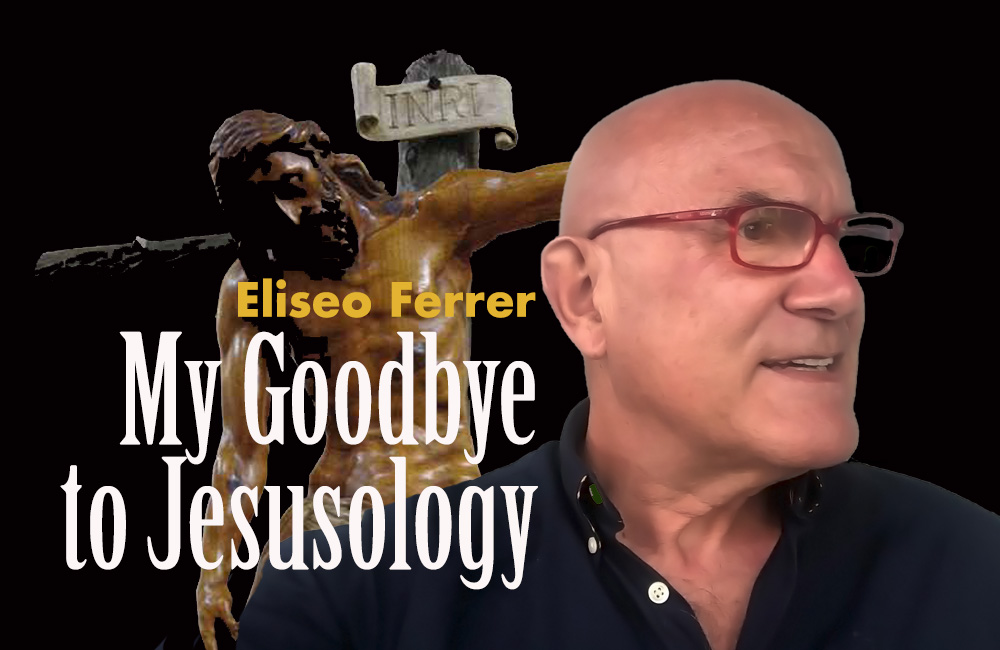
© Eliseo Ferrer (From a materialist anthropology).
Clarifications about my position in relation to a matter that worries so much in social networks in Spanish: Did Jesus of Nazareth exist?
I don’t think my position on the existence or non-existence of the Jesus of history is of much interest in and of itself to many people; it does, however, I think, in relation to my book «Sacrifice and drama of the Sacred King»; a work that is experiencing a strong commercial momentum in recent months (according to what they tell me from the publisher), and that due to its voluminous nature (800 pages) makes many people reach hasty (and even wrong) conclusions without having read its contents.
For this reason, I am going to try to make my position clear on the matter… And the first thing I want to say is that I have never affirmed, neither in this book, nor verbally nor in writing in comments or articles, that «Jesus of Nazareth never existed ». Evidently, I would have to be crazy or to be a donkey of capital category to make similar dogmatic affirmations of metaphysical character. What I have done in certain comments (and always outside of my book «Sacrifice and drama») has been to reject the inconsistent arguments used to demonstrate its historicity; that is, to oppose, in general terms, a «Jesusology» that is not very responsible with the truth criteria, isolated from the Christian faith (from theology), and often disguised in academic clothing.
So, consequently, I have never affirmed that «Jesus of Nazareth existed» and walked his dusty sandals through the history of Galilee and Judea. I have never said the one, nor have I ever said the other; neither in the book «Sacrifice and drama» nor in any of my articles and comments, nor in the social networks in which I usually participate. As is known, I have always considered it a matter of little cultural interest (if we place the figure of Jesus outside the Christian faith) and of lesser intellectual importance (compared to the great challenge presented by the origins of Christianity): a point only within of the twelve texts that I recently published (about the fraudulent and sterile research on Christian origins), and one of the million epistemological problems that a rigorous and serious research on these matters presents. In reality (and I repeat), in «Sacrifice and drama of the Sacred King» (in whose introduction I express my «essential atheism», or philosophical) I do not dedicate a single line to this matter of the historicity or not of the figure of Jesus of Nazareth , when, on the contrary, I dedicate 800 pages to the genealogy, anthropology, textuality and history of the myth of Christ.
What I have said and reiterated (even denounced) in articles, interviews and on this and other Internet networks (never in the aforementioned book), is that the «historical Jesus» or the «Jesus of history» who sold by certain disseminators and best-selling writers (considered in isolation and detached from the Christian religious tradition) is a real joke that reveals the intellectual and moral spirit of those who write this type of novels of fraudulent story. A joke (the one from the movie «the seditious Jesus» or the one about «the armed Galileo») that, however, many people accept, buy and consume with pleasure and delight. Therefore, even if it is only out of respect for all those people who, making use of their freedom, consume this type of editorial products with innocence and candor, I promise not to speak about these matters again for many years; because in the end It will not is a matter that interests me or distracts my attention. Those who write these books are free to do so (as long as there are trees left to make paper), and those who buy them, much freer still, because they also pay for them.
Let it be clear, and I summarize, that I have never said anywhere that «Jesus of Nazareth never existed»; Well, if I don’t find convincing evidence and arguments to affirm its existence, much less to deny it from repugnant metaphysical positions that have always been foreign to me. My criticisms, precisely because of this lack of evidence, have invariably been directed at a supposed «science» of «the historical Jesus» that is nothing more than a subcultural and ideologized construction of teachers and writers eternally handcuffed to the ideology and folklore of the Church, and what I call «Jesusology». For this reason, in this, as in many other matters (exoanthropology, for example), I declare myself an agnostic (with privative alpha: here is a useful phrase created by Thomas H. Huxley and inspired by Christian Gnosticism) because I am not even an enlightened seer that I can glimpse the past, I do not know, nor do I find evidence, nor am I convinced by the arguments of the priest-professors of that lay faith that is all the rage on the Internet and on social networks in Spanish.
But don’t tell me, as I have often been hearing out there that from the Synoptic Gospels and from an interpolated quotation from Flavius Josephus one can make «historical science» (there is so much fatuity that «history» does not seem enough to them and they add the word «science» to hide its inconsistency). Do not tell me either that «Jesus never existed» because this is an unfortunate and metaphysical statement that says everything about the lowest intellectual level of the one who utters it. Let believers speak freely, yes, and whatever they want about the «man Jesus» (of course!), Well, they are within their rights… And whoever decides to follow in the footsteps of my agnosticism, you know… In matters of «Jesusology», silence!
© Eliseo Ferrer

